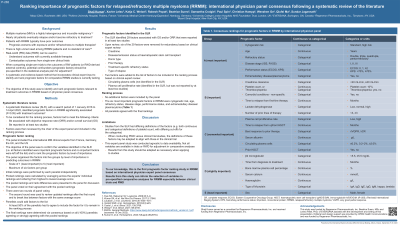Treatment of Relapsed/Refractory Myeloma
Poster Session 2
P-282: Ranking Importance of Prognostic Factors for Relapsed/Refractory Multiple Myeloma (RRMM): International Physician Panel Consensus following a Systematic Review of the Literature
Thursday, September 28, 2023
12:30 PM - 1:30 PM EEST


Shaji K. Kumar, MD
Professor of Medicine/Consultant
Mayo Clinic, Rochester, MN, US
Rochester, Minnesota, United States
Introduction: Multiple myeloma (MM) is a highly heterogenous and incurable malignancy. Nearly all patients eventually relapse and/or become refractory to treatment. Patients with relapsed and/or refractory MM (RRMM) typically have poor outcomes, and prognosis worsens with exposure and/or refractoriness to multiple therapies. There is a high unmet need among RRMM patients and there is no single standard of care. Real-world data (RWD) can be used to understand outcomes with currently available therapies and to establish benchmarks for clinical trials. When comparing outcomes in single-arm trials to RWD, it is best practice to pre-specify confounders for adjustment. A systematic, evidence-based, and clinically validated method to identify and rank prognostic factors for pre-specification in comparative RRMM studies is currently lacking. The objective of this study was to identify and rank prognostic factors relevant to treatment outcomes in RRMM based on physician panel consensus.
Methods: A systematic literature review (SLR; Kumar 2023, PROSPERO CRD42022330369) identified prognostic factors in RRMM that were significantly associated (p < 0.05) with outcomes. Factors associated with objective response rate (ORR) and/or overall survival (OS) and were reported in at least two studies were validated by a clinical expert and included in the ranking process.
A panel of five international (United States, France, Germany, UK) MM clinical experts was assembled to confirm the variables identified in the SLR and to rank the prognostic factors. The panel was asked to organize the factors into five groups, with each group representing the level of importance of in terms of predicting outcomes in RRMM. Initial rankings were performed independently. Pooled rankings were calculated by averaging across the experts’ rankings on a scale of 1 (least important) – 5 (most important).
The pooled rankings and rank differences were presented to the panel for discussion. There were two rounds of panel voting. If 50% of the panel disagreed with the pooled rankings, another round of individual ranking was conducted. The final rankings were determined via consensus based on all (100%) panelists agreeing or strongly agreeing with the pooled rankings.
Results: The SLR identified 29 factors associated with OS and/or ORR that were reported in at least two studies. Six factors were excluded for redundancy and two were added based on clinical expert opinion. A total of 25 factors were included in the ranking process. The six most important prognostic factors in RRMM were cytogenetic risk, age, refractory status, disease stage, performance status, and extramedullary disease/plasmacytoma. All panelists agreed with the final rankings.
Conclusions: This is the first prognostic factor ranking study in RRMM based on international physician panel consensus. Results from this prognostic factor ranking can inform the selection of variables in pre-specified comparative analyses especially between clinical trials and RWD.
Methods: A systematic literature review (SLR; Kumar 2023, PROSPERO CRD42022330369) identified prognostic factors in RRMM that were significantly associated (p < 0.05) with outcomes. Factors associated with objective response rate (ORR) and/or overall survival (OS) and were reported in at least two studies were validated by a clinical expert and included in the ranking process.
A panel of five international (United States, France, Germany, UK) MM clinical experts was assembled to confirm the variables identified in the SLR and to rank the prognostic factors. The panel was asked to organize the factors into five groups, with each group representing the level of importance of in terms of predicting outcomes in RRMM. Initial rankings were performed independently. Pooled rankings were calculated by averaging across the experts’ rankings on a scale of 1 (least important) – 5 (most important).
The pooled rankings and rank differences were presented to the panel for discussion. There were two rounds of panel voting. If 50% of the panel disagreed with the pooled rankings, another round of individual ranking was conducted. The final rankings were determined via consensus based on all (100%) panelists agreeing or strongly agreeing with the pooled rankings.
Results: The SLR identified 29 factors associated with OS and/or ORR that were reported in at least two studies. Six factors were excluded for redundancy and two were added based on clinical expert opinion. A total of 25 factors were included in the ranking process. The six most important prognostic factors in RRMM were cytogenetic risk, age, refractory status, disease stage, performance status, and extramedullary disease/plasmacytoma. All panelists agreed with the final rankings.
Conclusions: This is the first prognostic factor ranking study in RRMM based on international physician panel consensus. Results from this prognostic factor ranking can inform the selection of variables in pre-specified comparative analyses especially between clinical trials and RWD.
